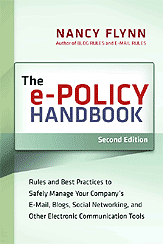
Think eMail is a safe and speedy way to send Valentine's Day greetings? Think again. Employees who send eLove notes on company time may find themselves embarrassed and unemployed. Employers who permit workers to send romantic eMails could land in court. Fully 27% of Fortune 500 companies have battled sexual harassment claims stemming from employee misuse and abuse of corporate eMail and Internet systems. With 130 million US workers sending 2.8 billion eMails daily, the possibility of employees using company computers to send off-color or otherwise inappropriate eValentines is huge.
Fortunately, employers can take steps to prevent eDisaster. Nancy Flynn,
executive director of The ePolicy Institute (www.epolicyinstitute.com)
and author of
The ePolicy Handbook, recommends employers implement
written ePolicies that prohibit sending romantic eMail messages, downloading pornographic Internet images, and participating in adult online chat. "Written ePolicies help employers control written content, employee behavior, and eLiabilities," said Flynn. "For responsible organizations operating in the age of electronic communication, an ePolicy is an indispensable business tool."
For employees tempted to send eLove notes in spite of employer prohibitions, The ePolicy Institute offers a word of advice: Don't. "Shooting Cupid's arrow through cyberspace may be the quickest way to express your love, but it's far from the safest. Hit the wrong key and your hot message could land on the cold screens of your supervisors, colleagues, or customers," warned Flynn. "If your beloved forwards your eValentine, your electronic expression of love could be shared with millions of strangers."
Take the case of Claire Swire, a British woman who suffered
international embarrassment when boyfriend Bradley Chait forwarded
to friends an eLove note complimenting Chait's performance during
a night of passion. Forwarded from reader to reader, Swire's
eMail quickly traveled to 10 million computers in England,
New Zealand, Hong Kong, Australia, and the US. Media
coverage, including the London tabloids, The New York Times, and Today, helped drive Swire into hiding. Chait and others who first sent Swire's eMail into cybercirculation were disciplined for violating their respective employers' eMail policies.
The best advice, according to The ePolicy Institute: Employers eager to limit eLiabilities should implement written ePolicies. Employees interested in protecting their professional and personal reputations should adhere to their organizations' ePolicies.
The ePolicy Institute (www.epolicyinstitute.com) is the leading
online source of ePolicy books, forms, content, and training tools.
The ePolicy Institute is devoted to helping employers limit eRisks
through the development and implementation of effective eMail,
Internet, and software policies. For a review copy of
The ePolicy Handbook or to interview Nancy Flynn, call 614/451-3200 or eMail Nancy@ePolicyInstitute.com.
|





